(Note: If you haven’t read it yet, my introductory post on this Star Trek: The Original Series rewatch is a good place to start.)
Original Air Date: October 11, 1968
Crew Death Count: 2 (Security officers are beamed into space when the Enterprise departs Triacus)
Bellybuttons: 0
“And the Children Shall Lead” revisits the children-in-charge storyline of “Miri” but does a much poorer job than that season one episode. This week, the Enterprise responds to a distress call from a Federation research outpost on the planet Triacus. A landing party of only Kirk, Spock, and McCoy – because you definitely don’t want any Enterprise security personnel with you if there’s a distress call – find all the adults on Triacus dead by their own hands, with only five children surviving. We soon learn that the children are under the spell of a sinister lawyer force that remains invisible unless summoned by the children. The alien being has a vague plan to kill more people and convert more people because that’s what sinister forces do. The biggest problem with “And the Children Shall Lead” is that it tries to be a kitchen-sink episode, introducing a variety of themes and going nowhere with any of them.
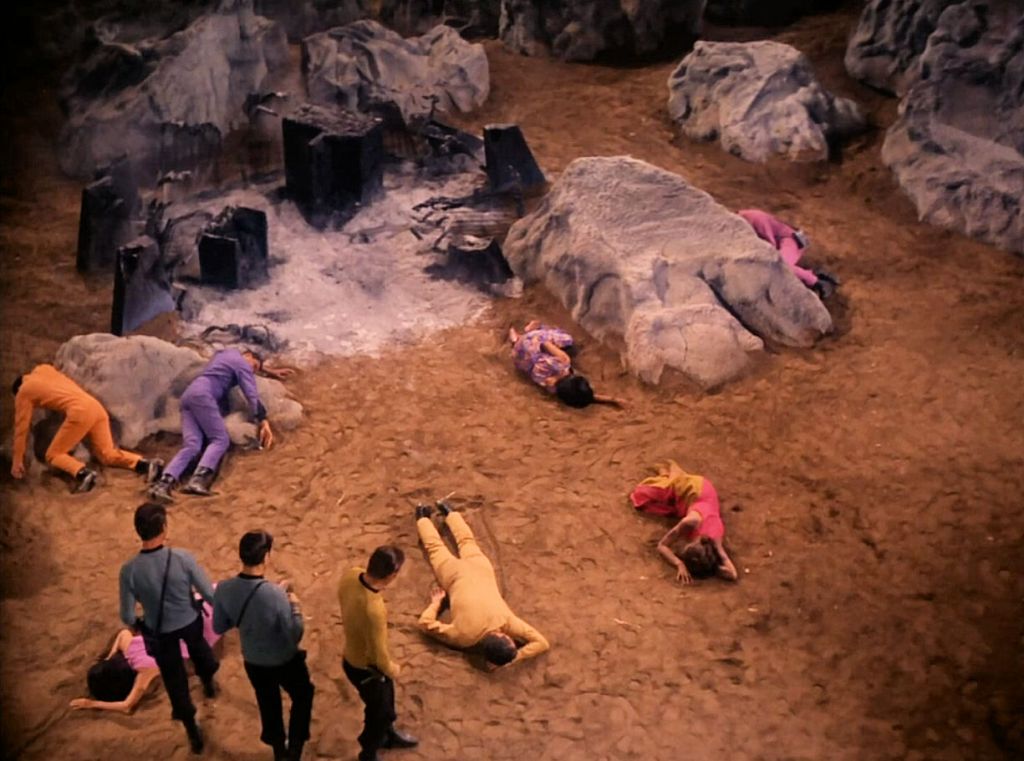
The title comes from the Old Testament Book of Isaiah 11:6: “The wolf also shall dwell with the lamb, and the leopard shall lie down with the kid; and the calf and the young lion and the fatling together; and a little child shall lead them.” The passage refers to the widespread peace expected after the arrival of the messsiah; wolf, lamb, lion, and calf all coexist in safety. “And the Children Shall Lead” inverts the theme, however, as the episode deals with the presence of evil and its corruption of the innocent. As the alien convinces the children that they want what he wants, we’re reminded more than once that evil needs help in order to flourish. As the crew deciphers the mystery of the alien power, Spock says, “Evil does seek to maintain power by suppressing the truth.” McCoy responds, “Or by misleading the innocent.” Later, Spock is on the verge of recommending that the children be killed in order to save the ship. Unable to identify who is manipulating the kids, and losing control as one crew-member after another falls under the childrens’ mental control, Spock tells Kirk, “Without followers, evil cannot spread.”
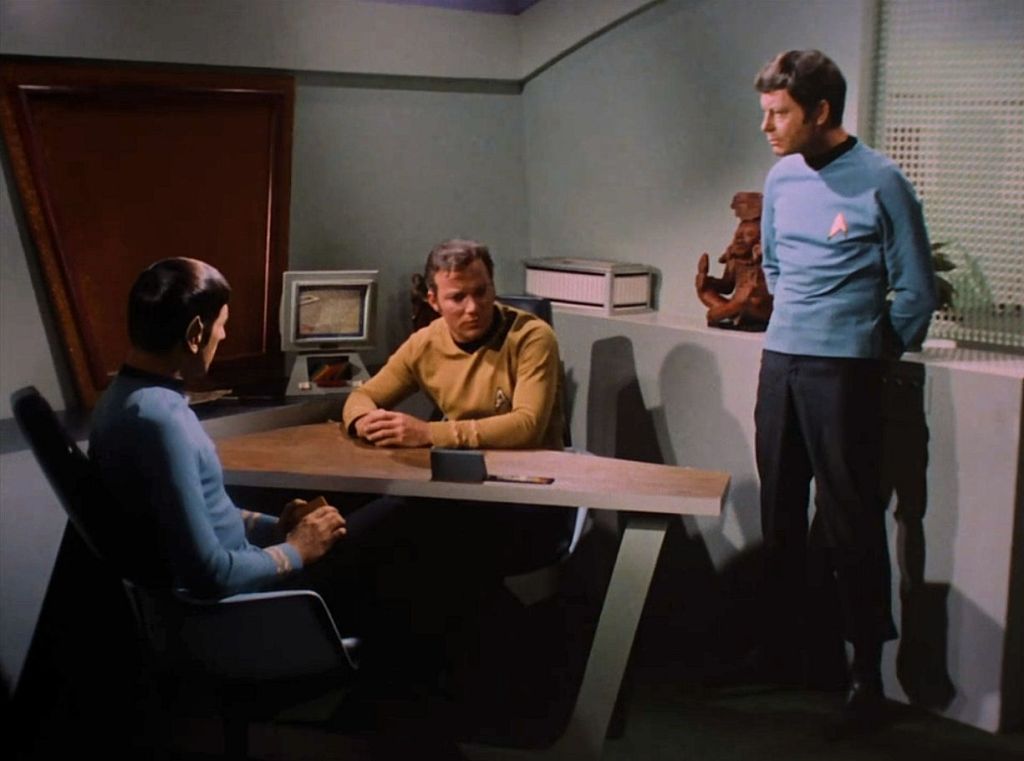
The alien converts the children because of their innocence and intellectual immaturity. Through flashbacks we see the adults on Triacus were on the verge of figuring out the strange anxiety that ultimately drove them to take their own lives, leaving only the children as acceptable converts. The childrens’ love of play is contrasted with the adults’ tendency to stay “always busy” and “always upset”: Kirk wants answers to his many questions, while the kids are content to join hands in a circle and chant Ring Around the Rosie. The “all fall down” game dates back perhaps to the 1700s and was not inspired by the 17th century Great Plague, as was once believed, but was more likely inspired by pagan myths and customs. The alien exploits this desire for play, telling the children, “The universe will be mine to command, yours to play in.” Likewise, the alien expects the Enterprise crew to be easy targets because they are gentle, kind, and good, all signs of weakness in his eyes. It’s only when the adults fight back that the alien becomes angry. Like all ideological movements – whether political or religious – conversion at a young age is the best way to gain lifelong followers. Participation of the young was essential to the Nazis in the 1930s and Mao’s Cultural Revolution launched in 1966, and has been important to organized religions throughout history.
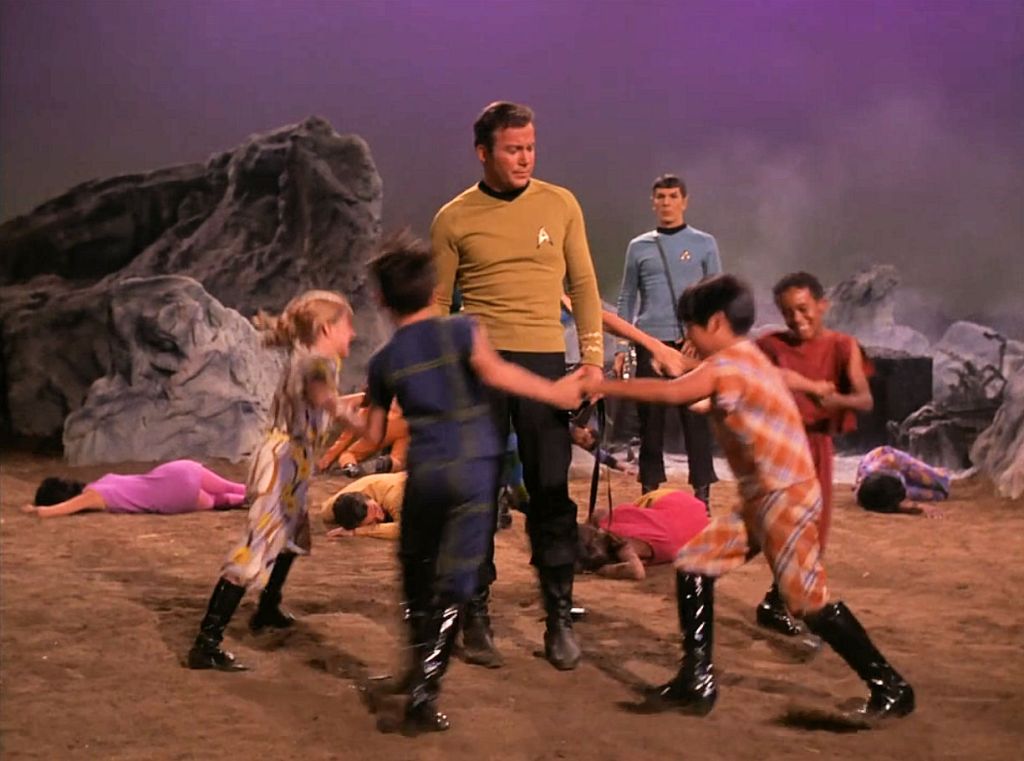
Those political and religious causes had clear motivations relating to accumulating and preserving power. The alien’s motive is never entirely clear: we learn he is called Gorgan – whether that’s the individual’s name or the species is never spelled out. The character was played by famous attorney Melvin Belli, who was given the role after his son, Caesar Belli, was cast as one of the children. Belli was perhaps most notorious for representing Jack Ruby after Ruby assassinated Lee Harvey Oswald. (Ruby received a death sentence, which was later overturned, but Ruby died in prison before another trial with new lawyers took place.) Belli made a much bigger contribution, however, in the field of consumer rights in the 1940s and 1950s, when he argued for the concept of an implied warranty, meaning that products are sold with certain assurances to users whether or not those assurances are specified by the seller, and that “negligence by a defendant need not be proven if the defendant’s product is defective.” Belli was also present when the serial killer known as the Zodiac made a brief telephone call to a live TV broadcast. As depicted in David Fincher’s 2007 film Zodiac, the killer asks Belli (played by Brian Cox) about his appearance in “And the Children Shall Lead.” And is it just my imagination, or does Melvin Belli bear a very slight resemblance to psychedelic guru Timothy Leary, who only a year earlier had terrified parents by urging their offspring to “turn on, tune in, drop out?”

If you think that digression about Melvin Belli is off topic, I haven’t forgotten the question of Gorgan’s motive, it’s just that serial killers and David Fincher movies are more interesting than this episode. In the short term, Gorgan wants the children to divert the Enterprise to a large Federation settlement on the planet Marcos XII, where he expects to find many new followers. In the long term, however, that line about commanding the universe is all we have to work with. Spock shares a rambling legend about space-faring marauders “who made constant war throughout the system” and “were themselves destroyed by those they had preyed upon.” The legend “warns that the evil is awaiting a catalyst to set it again into motion and send it marauding across the galaxy.” We’re apparently meant to assume that the science work on Triacus provided the catalyst by freeing the evil. The lead researcher, Professor Starnes (James Wellman), talks about a species on Triacus being killed by a natural catastrophe. Were they the marauders? It’s all a bit muddled. Perhaps attention and subservience from others is all Gorgan wants. It’s hard not to think of a certain Very Stable Genius when Gorgan dissolves at the end, like the Wicked Witch melting in water, complaining bitterly but powerless without his mindless followers.
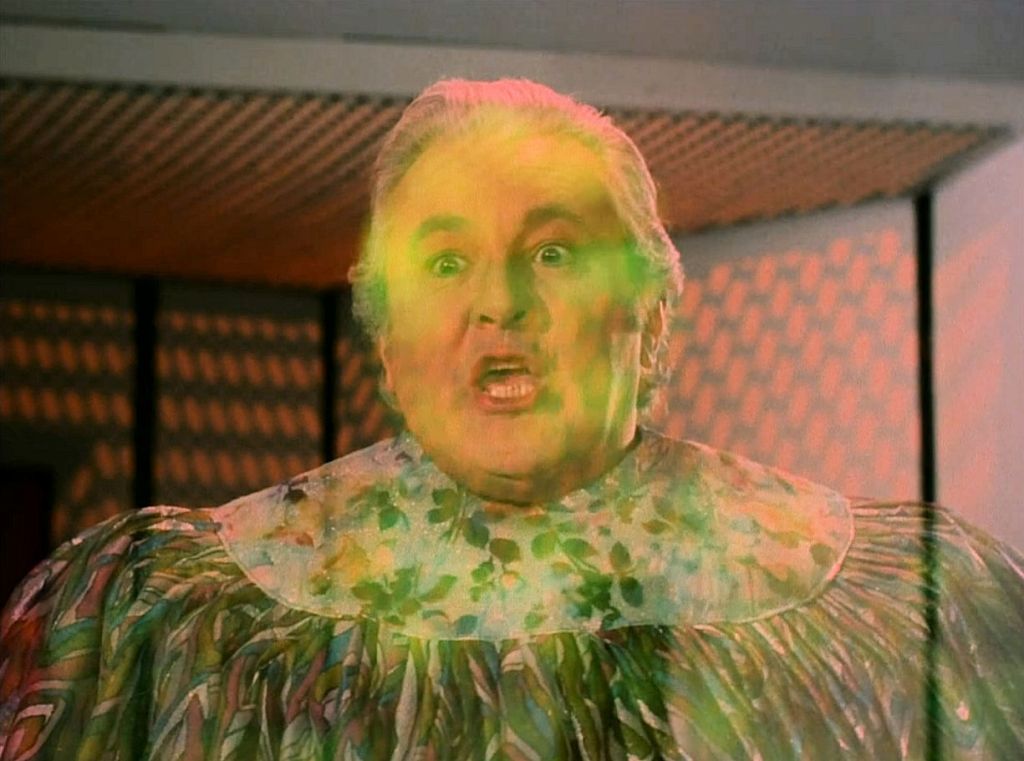
Gorgan’s dependence on his followers is literal: he has no corporeal form and has no power beyond verbal manipulation. The children refer to Gorgan as a “friendly angel” and summon him with a chant – which leaves us to wonder how Gorgan made his initial appearance. Once the children demonstrate their bizarre fist-shaking mind control powers, it’s unclear if they or Gorgan caused the Triacus scientists to kill themselves. When Spock and Kirk enter the cave on Triacus, Kirk is nearly overwhelmed by anxiety while Spock remains unaffected. The emotion is location-specific, as if they have stumbled on Gorgan himself. Yet later, on the Enterprise, the children do briefly take control of Spock’s mind, as if they have the real power. This was an opportunity to explore runaway power and what happens when the followers take control, much as Republicans of the late 1990s and early 2000s encouraged radicalism that inspired the Tea Klan and the extremists who followed, while those earlier establishment members today scratch their heads over how their aw-shucks political party could be overrun by such overemotional rascals. “And the Children Shall Lead,” however, misses this opportunity as it does all the others.
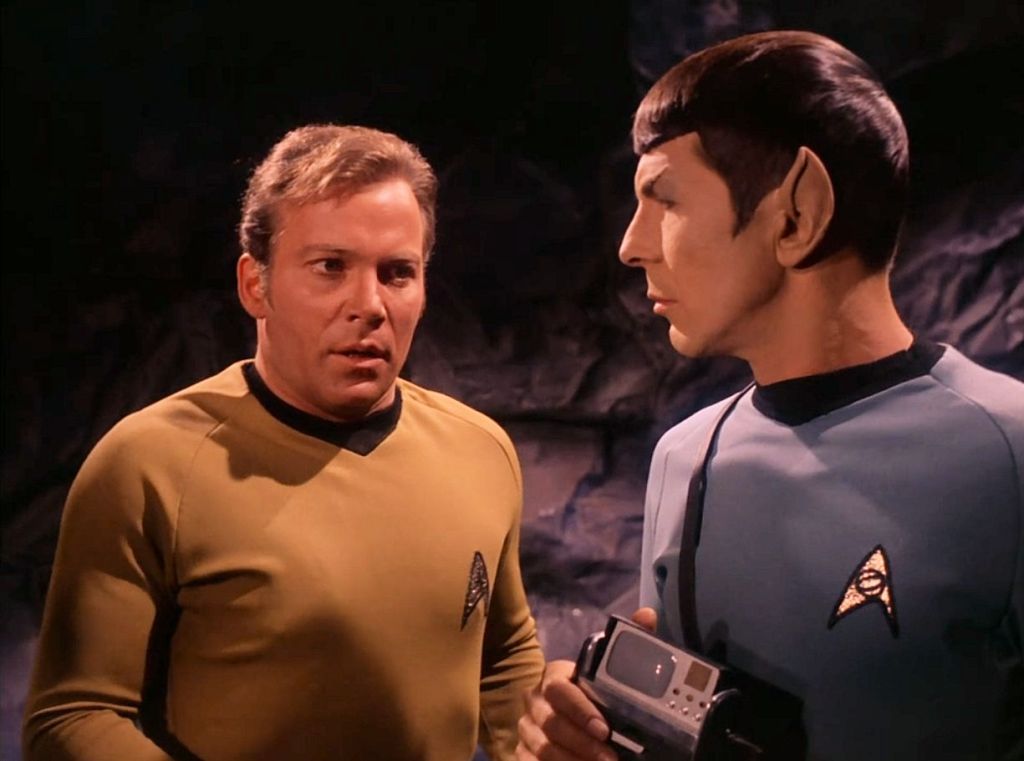
We also never understand why there’s only one Gorgan. This is a common premise in TOS – “The Immunity Syndrome” and “The Doomsday Machine” come to mind – and we can only imagine how much more difficult life would be if there were two Gorgans or a hundred. This one does a thorough enough job exploiting the crew’s fears, more might be overwhelming. “If resistance mounts, call upon their beasts,” Gorgan tells the children. “Their beasts will serve us well. The fear in each one of them is the beast which will consume him.” Again, the children manifest the individual fears by shaking their fists, but the concept of exploiting fear is Gorgan’s: Sulu sees the Enterprise surrounded by massive swords, appropriate for a fencing expert; Uhura imagines herself withered with age, because she’s a girl she expressed a desire for eternal youth in “I, Mudd”; Scott the engineer fears for the integrity of the ship’s systems; Kirk’s greatest fear is losing control of the Enterprise. Others, however, are subject to more direct mind control: Spock hesitates to contact Starfleet Command per Kirk’s order and Chekov attempts to take Kirk into custody with a phaser, as he did in “Mirror, Mirror.”

And why is Chekov the only person to remember they have phasers? Those sure would have come in handy earlier. The crew’s conduct overall is inconsistent. Chapel gets the most insightful line of the episode, when one of the kids complains about the flavor of ice cream he received: “There are unpleasant surprises as well as pleasant ones.” It’s a valuable lesson that never gets reinforced, especially since Chapel immediately offers the complainer another ice cream. McCoy wisely diagnoses the kids with lacunar amnesia, a real condition that involves loss of memory of a specific event. (Lacunar amnesia might explain why the children are more affected by the video of their parents’ deaths than the real events.) He is also the only one concerned about the childrens’ state of denial over their parents’ deaths and how they will process the inevitable grief. Unfortunately, McCoy is written out of much of the episode, so we never see what he’s up to while the children terrorize the crew. Kirk, as happened too often in TOS, forgets that he’s an explorer and focuses entirely on defeating his enemy. He soon forgets about the two security officers beamed into dead space when the transporter officer thought they were going to Triacus; he’s equally absent-minded about the security detachment left behind on Triacus who must be fairly traumatized by now. And Kirk is wise to look embarrassed by the Federation flag he plants over the scientists’ graves – it looks like something out of Duck Dodgers.
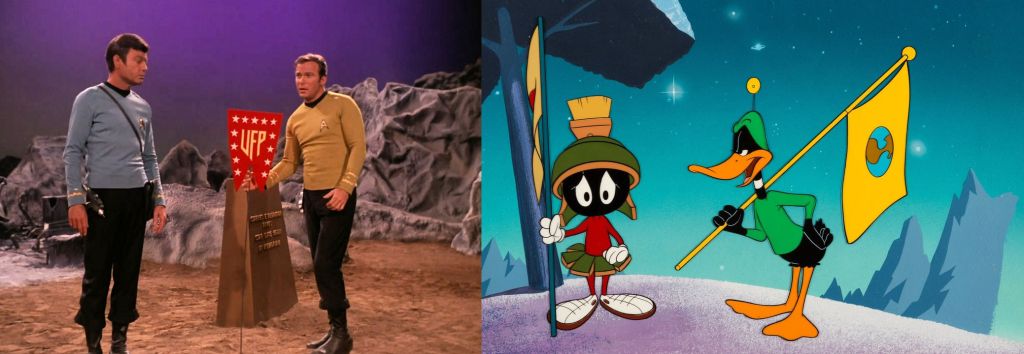
Besides the episode’s failure to follow-up on the concepts of leaders’ radicalization of their followers or brainwashing of the easily impressionable, there are also potential lessons on parenting and youth culture that seem to have flown right past the writers. Did the researchers on Triacus neglect their children (they were “always busy”), making it easier for them to fall under the spell of a charismatic manipulator? Or, conversely, were the children over-indulged, believing life to be an endless recess? The gap between parents and children was probably greater in the late 1960s than it had been in human history (“Parents like stupid things,” one of the children says), due in part to the sheer number of young people throughout the world – the post-war Baby Boom wasn’t limited to the United States – and the proportion of them who had greater freedom, spending power, and access to education than any previous generation of their age.
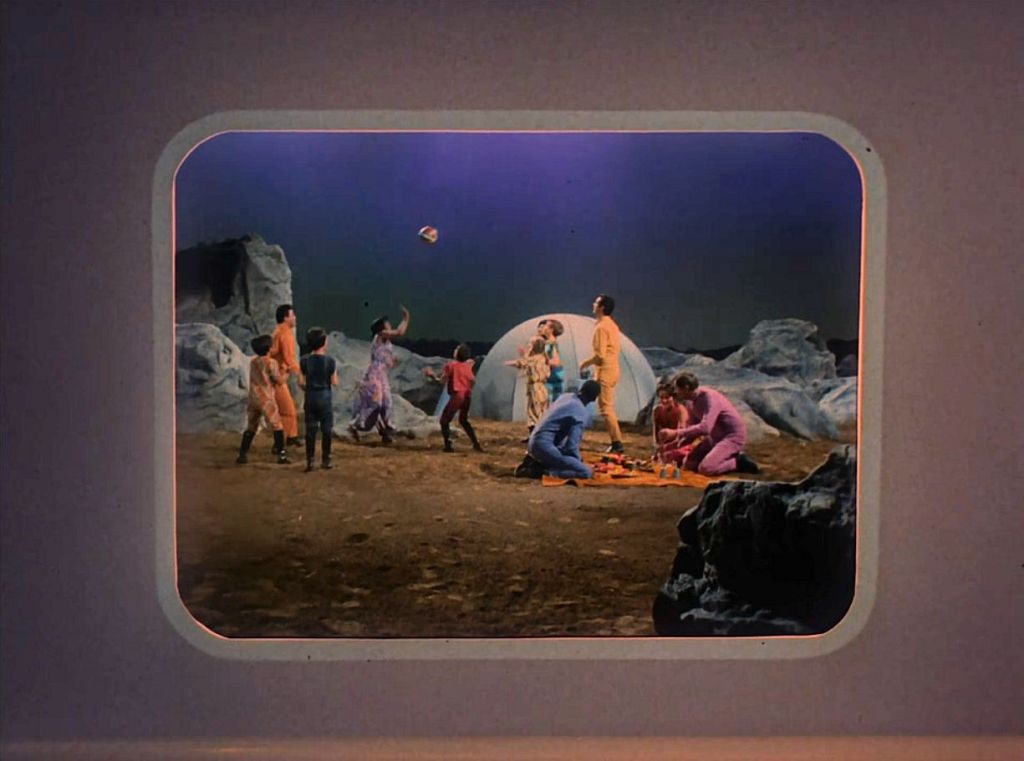
The one valid message in the episode involves the resolution of emotions. The time-frame is collapsed to accommodate a one-hour TV episode, but Kirk – and to a lesser extent Spock, since fear is not precisely what he experiences here – becomes immune to Gorgan once he confronts his fear, in a moving turbolift scene that demonstrates the close friendship between the captain and his first officer. “My beast is finished,” Kirk says. “It won’t return.” Likewise, the children are freed from Gorgan’s grip once they acknowledge their grief. As with manipulators in real life, simply recognizing Gorgan for the powerless huckster he is provides liberation, as summarized in an exchange between Gorgan, Spock, and Kirk:
Gorgan: “We take what is ours wherever we go.”
Spock: “You take from those who do not know you.”
Kirk: “And we know you.”
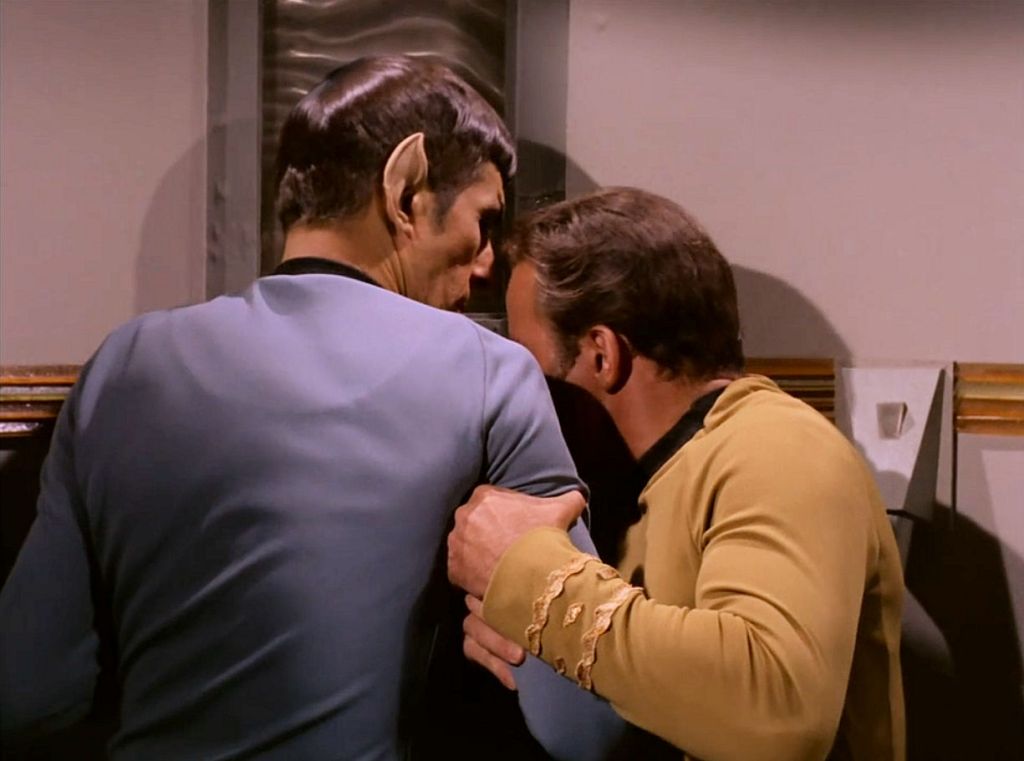
Whatever our station in life, sooner or later we are all taken advantage of. Figuring out who to trust is one of life’s great challenges. As Nurse Chapel reminds us, surprises aren’t always pleasant, but how we respond to unpleasantness defines our character. The Enterprise crew has evidence to alert them to Gorgan’s danger: the deaths of the settlers, the ship’s monitors indicating they no longer orbit Triacus. The children are in a much more vulnerable position. Lacking the adults’ life experience and unable to register their parents’ demise until confronted with the visual evidence, it’s no wonder they fall victim to Gorgan. They do experience moments of hesitation, particularly the oldest, Tommy (Craig Huxley). After all, the Enterprise crew offers concern for their safety (not to mention ice cream); Gorgan only talks about ruling the universe. Those moments of hesitation are the time to reevaluate our choices. We don’t need to indulge our self-doubts, but we must take the time to examine them. Even the best-navigated ship needs course corrections once in a while. “Humans do have an amazing capacity for believing what they choose,” Spock says early in the episode. “And excluding that which is painful.” It’s significant that the tyrant is the only character who never expresses doubt. Aspiring to perfection is a noble endeavor. But if we ever believe we’ve achieved it, we’ll know we’ve become the villains in our own story.